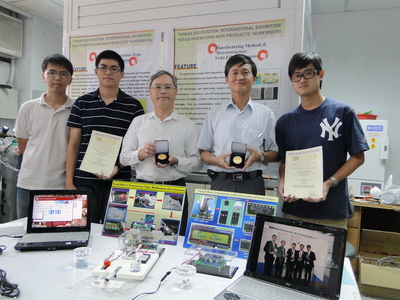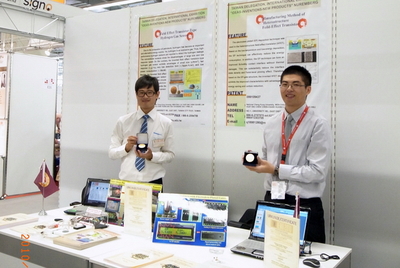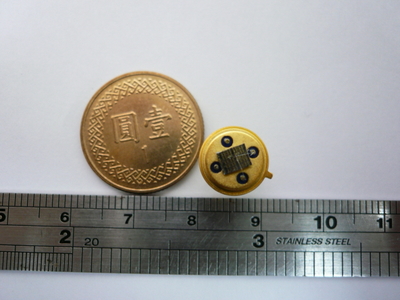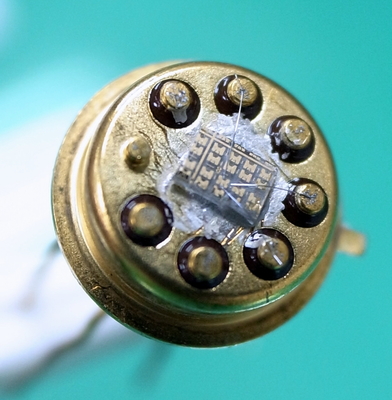NCKU Electrical Engineering Research Team Won Two Gold Medals at iENA




Tainan, Taiwan, November 17th, 2010
The inter-disciplinary research team led by Prof. Wen-Chau Liu of Institute of Microelectronics at National Cheng Kung University (NCKU), Tainan, Taiwan, has won two gold medals at 2010 International Trade Fair “Ideas-Inventions-New Products” (iENA) Nuremberg, Germany, with the inventions of Field-Effect Transistor-Type Hydrogen Gas Sensor and Manufacturing Method of Heterostructure Field-Effect Transistor.
More than 800 inventions and new product ideas from 37 countries have participated in the world-leading international trade fair, and among them, the two inventions of NCKU Research Team, which have strong functions and excellent performance of energy saving and carbon reduction, have won two gold medals.
The Field-Effect Transistor-Type Hydrogen Gas Sensor, which has won gold medal at the 38th International Exhibition of Inventions of Geneva, has once again won a gold medal at 2010 International Trade Fair “Ideas-Inventions-New Products” (iENA) Nuremberg.
Doctoral student Tai-You Chen of NCKU Institute of Microelectronics expressed, “Due to the exhaustion of petroleum, hydrogen has become an important and alternative energy source. Yet, hydrogen is an explosive gas. Thus, high-performance hydrogen sensors are required to detect the hydrogen leakage.”
The conventional sensors show the disadvantages of large size and low response speed. On the contrary, the invented Field-Effect Transistor-Type Hydrogen Gas Sensor exhibits advantages of small size, fast response, very low detection limit, and low power consumption. The invented field-effect transistor-type hydrogen gas sensor can be made as integrated circuits when combined with other electronic devices. This surely extends the versatility of the invented sensor.
By relying on the professional specialty of Prof. Huey-Ing Chen of NCKU Department of Chemical Engineering, the team used water to produce hydrogen and thus further improved the operation of the sensor. The vivid display of the Field-Effect Transistor-Type Hydrogen Sensor has received wide acclaim from the judges.
In addition, the Field-Effect Transistor-Type Hydrogen is mainly applied on public safety, such as hydrogen leak monitors of chemical factories, hydrogen input monitors required during semiconductor manufacture, hydrogen leak monitors of automotive and aerospace industrial fuel cells and hydrogen leak monitors required during medical equipments manufacture.
Members of Field-Effect Transistor-Type Hydrogen team include Prof. When-Chau Liu of NCKU Institute of Microelectronics, Prof. Huey-Ing Chen of NCKU Department of Chemical Engineering, Associate Prof. Kun-Wei Lin of Department of Computer Science and Information Engineering at Chaoyang University of Technology, and doctoral students Tai-You Chen, Tsung-Han Tsai and Chi-Shiang Hsu from NCKU Institute of Microelectronics.
“The electroless plated (EP) deposition technique was used in the Heterostructure Field-Effect Transistor (HFET). Based on the low-temperature and low-energy deposition, the EP technique can effectively reduce energy consumption,” said doctoral student Chien-Chang Huang of NCKU Institute of Microelectronics as he explained the Manufacturing Method of Heterostructure Field-Effect Transistor.
The EP technique can form an improved Schottky contact interface without thermal damages. It can also substantially reduce the interface state density and Fermi-level pinning effect. Thus, based on the EP-gate structure, the invented HFET device exhibits the improved characteristics with advantages of energy saving and carbon reduction.
Members of Manufacturing Method of Heterostructure Field-Effect Transistor team include Prof. Wen-Chau Liu of NCKU Institute of Microelectronics, Prof. Wei-Chou Hsu of Institute of Microelectronics, Prof. Huey-Ing Chen of NCKU Department of Chemical Engineering, and doctoral students Chien-Chang Huang, Li-Yang Chen and Chi-Shiang Hsu from NCKU Institute of Microelectronics.
The inter-disciplinary research team led by Prof. Wen-Chau Liu of Institute of Microelectronics at National Cheng Kung University (NCKU), Tainan, Taiwan, has won two gold medals at 2010 International Trade Fair “Ideas-Inventions-New Products” (iENA) Nuremberg, Germany, with the inventions of Field-Effect Transistor-Type Hydrogen Gas Sensor and Manufacturing Method of Heterostructure Field-Effect Transistor.
More than 800 inventions and new product ideas from 37 countries have participated in the world-leading international trade fair, and among them, the two inventions of NCKU Research Team, which have strong functions and excellent performance of energy saving and carbon reduction, have won two gold medals.
The Field-Effect Transistor-Type Hydrogen Gas Sensor, which has won gold medal at the 38th International Exhibition of Inventions of Geneva, has once again won a gold medal at 2010 International Trade Fair “Ideas-Inventions-New Products” (iENA) Nuremberg.
Doctoral student Tai-You Chen of NCKU Institute of Microelectronics expressed, “Due to the exhaustion of petroleum, hydrogen has become an important and alternative energy source. Yet, hydrogen is an explosive gas. Thus, high-performance hydrogen sensors are required to detect the hydrogen leakage.”
The conventional sensors show the disadvantages of large size and low response speed. On the contrary, the invented Field-Effect Transistor-Type Hydrogen Gas Sensor exhibits advantages of small size, fast response, very low detection limit, and low power consumption. The invented field-effect transistor-type hydrogen gas sensor can be made as integrated circuits when combined with other electronic devices. This surely extends the versatility of the invented sensor.
By relying on the professional specialty of Prof. Huey-Ing Chen of NCKU Department of Chemical Engineering, the team used water to produce hydrogen and thus further improved the operation of the sensor. The vivid display of the Field-Effect Transistor-Type Hydrogen Sensor has received wide acclaim from the judges.
In addition, the Field-Effect Transistor-Type Hydrogen is mainly applied on public safety, such as hydrogen leak monitors of chemical factories, hydrogen input monitors required during semiconductor manufacture, hydrogen leak monitors of automotive and aerospace industrial fuel cells and hydrogen leak monitors required during medical equipments manufacture.
Members of Field-Effect Transistor-Type Hydrogen team include Prof. When-Chau Liu of NCKU Institute of Microelectronics, Prof. Huey-Ing Chen of NCKU Department of Chemical Engineering, Associate Prof. Kun-Wei Lin of Department of Computer Science and Information Engineering at Chaoyang University of Technology, and doctoral students Tai-You Chen, Tsung-Han Tsai and Chi-Shiang Hsu from NCKU Institute of Microelectronics.
“The electroless plated (EP) deposition technique was used in the Heterostructure Field-Effect Transistor (HFET). Based on the low-temperature and low-energy deposition, the EP technique can effectively reduce energy consumption,” said doctoral student Chien-Chang Huang of NCKU Institute of Microelectronics as he explained the Manufacturing Method of Heterostructure Field-Effect Transistor.
The EP technique can form an improved Schottky contact interface without thermal damages. It can also substantially reduce the interface state density and Fermi-level pinning effect. Thus, based on the EP-gate structure, the invented HFET device exhibits the improved characteristics with advantages of energy saving and carbon reduction.
Members of Manufacturing Method of Heterostructure Field-Effect Transistor team include Prof. Wen-Chau Liu of NCKU Institute of Microelectronics, Prof. Wei-Chou Hsu of Institute of Microelectronics, Prof. Huey-Ing Chen of NCKU Department of Chemical Engineering, and doctoral students Chien-Chang Huang, Li-Yang Chen and Chi-Shiang Hsu from NCKU Institute of Microelectronics.
Provider:
新聞中心
Date:
99-11-19